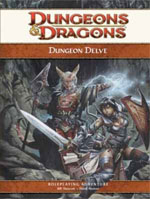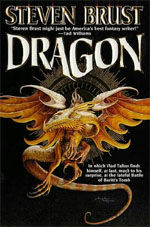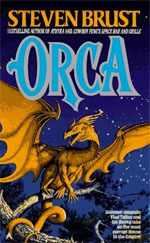 I was flipping through a friend’s copy of Dungeon Delve and took the opportunity to read through the introduction by Bill Slavicsek, the Director of R&D at WotC. He starts by describing the successful Dungeon Delves that WotC has run at various conventions over the past decade:
I was flipping through a friend’s copy of Dungeon Delve and took the opportunity to read through the introduction by Bill Slavicsek, the Director of R&D at WotC. He starts by describing the successful Dungeon Delves that WotC has run at various conventions over the past decade:
But from the opening of the show on Thursday, we knew we had found the crux of a winning formula. (…) The fans ate it up. We had enormous lines at the Delve that entire weekend. They lined up to get into the available party slots. They lined up to witness the action and see whether Monte Cook or Bruce Cordell or Ed Stark (or whoever else was part of the team at that time) could kill more characters as more and more of the Delve was revealed. They lined up to see the next dungeon details and character names get posted to the bulletin board. How far had they gotten? What had they killed? Who didn’t make it out of the last fight?
They had a winning format: A megadungeon serving as the shared campaign setting for a huge pool of players. They basically took core Old School play and condensed it down to a format that could be played rapid-fire over the couse of a convention weekend.
Nifty stuff.
With this book, the Dungeon Delve concept finally takes center stage as a core D&D product. It was a long time coming, but we needed that time to test concepts, try out new formats, and eventually get to the point where this product was not only viable, but in many ways necessary to the evolution of the D&D game.
This makes perfect sense. If you’re in the business of selling RPGs and you’ve got something that’s a proven success with RPG players, you should try to figure out how to bottle that success and sell it to the masses.
For the purpose of this product, a Dungeon Delve is a compact series of encounters appropriate for a specific level of play. This book contains 30 Dungeon Delves, one for each level of play. Each Delve features three encounters, forming a mini-adventure of sorts.
Wait… what?
So you had a format: Megadungeon. High mortality rate attracting lots of attention. Boatloads of players/characters sharing a single setting to create a sense of competition, rivalry, and shared accomplishment.
And your method of bringing this format to “center stage as a core D&D product” is to give us mini-dungeons featuring three encounters incapable of serving as a shared campaign setting in a system explicitly designed for low mortality rates?
WTF?
(And is it even possible for them to devalue the term “core” any more? Describing their splat books as “core” was bad enough, but now they’re actually claiming that their adventure modules are “core” products? Exactly what do you produce that isn’t a “core” product, WotC?)
Let me be clear here: There’s nothing wrong with either style of adventure. I think there’s room in any good campaign for both megadungeons and mini-adventures. I contributed mini-adventures to Atlas Games’ En Route II. My Mini-Adventure 1: Complex of Zombies is pretty much in the same ballpark. I haven’t actually taken a close look at the actual adventures in Dungeon Delve, but conceptually it’s an interesting and potentially useful product.
But what baffles me is a company saying, “Our goal is to do X. And in order to do X, we’re going to do not-X.”
I mean, there are many parts of the design of 4th Edition which followed that pattern: The designers say that they want to do X and then they release mechanics which either don’t do X or do the exact opposite of X.
I had simply assumed that was incompetence. But maybe that’s just the way that Slavicsek and his design team think. (Which would also explain why we got not-D&D when they tried to design D&D.)


